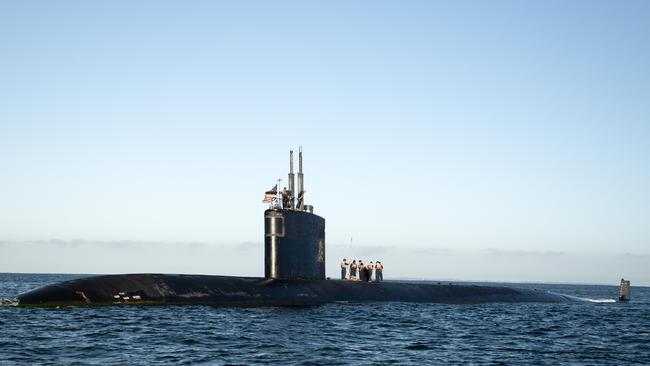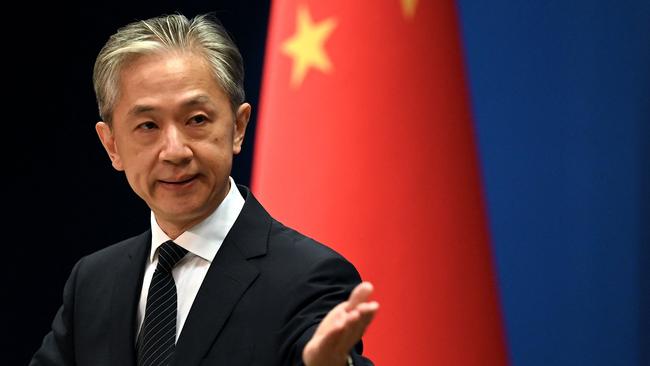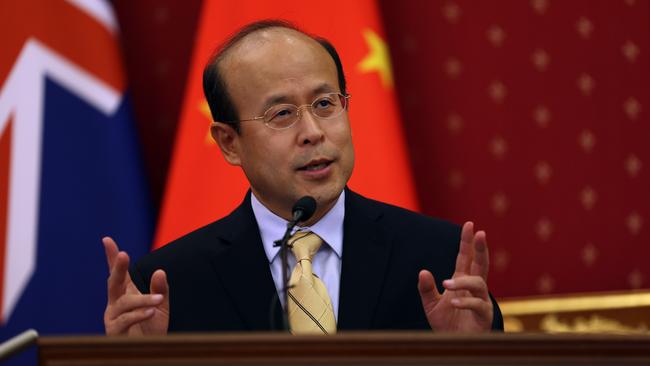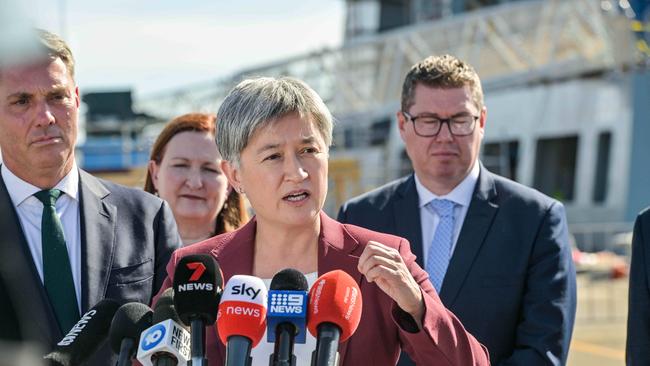
China’s Ministry of Foreign Affairs spokesman, Wang Wenbin, declared that the three countries involved – Australia, Britain and the US – had “totally disregarded the concerns of the international community and gone further down the wrong and dangerous path”.
The question to be asked now is whether the move and the theatre around it, while initially announced 18 months ago by the former Morrison federal government, will derail or delay the thawing of political and economic ties between the two countries which has been under way since the election of the Albanese government last May?

Until this week, economic ties between the two countries appeared to be on an upswing, with talks between the trade ministers of both countries expected to lead to a visit by Trade Minister Senator Don Farrell to China in coming months, reports that the coal trade between Australia and China has resumed after years of blockages and plans for a bevy of Australian business people to visit China in the next few months.
While Australia’s trade with China, by far its largest trading partner, has remained robust and boosted by the strength of the iron ore price, a thriving lithium export trade and strong demand in Australia for Chinese-made manufacturing products, the potential trade has been limited by official and unofficial moves against some $20bn worth of goods by China in recent years including coal, beef, timber, cotton, lobster, wine and barley.
With positive talk from China’s ambassador to Australia, Xiao Qian, and the Albanese government’s talk of “stabilisation” of the Australia-China relationship, it looked like the trade tensions – which were about China sending a message to Australia – were gradually being worked through.
At one point it seemed just a matter of time before issues such as tariffs on wine and barley would be resolved and the trade tensions a thing of the past.
Bloomberg reported this week that China is now allowing all domestic companies to import Australian coal, signalling an end to unofficial trade restrictions which have been in place since 2019.

This follows permission given to four major importers in China earlier this year to buy Australian coal.
China’s high-profile populist Global Times has been reporting each improvement in the trading relationship, noting recently that “China-Australia trade sees double digit growth amid improved ties,” and reporting that “full resumption of Australian coal (imports) may take place in April”.
But the question now is will Australia’s AUKUS announcement, and China’s anger about the deal, be just another irritant in a relationship which has had many ups and downs, or whether the thawing of trade tensions will stop or slow down as a result?
As Foreign Minister Penny Wong has said, China rejected the Albanese government’s offer of a briefing on AUKUS before this week’s grand ceremony in San Diego.
There are those on the optimistic side of the ledger, who argue that the Chinese have known for a long time that the AUKUS decision has been coming and the process of stabilisation including easing of trade tensions will continue.
These include Sydney University Professor James Curran, who told the Australian on Wednesday that: “The AUKUS decision announcement is unlikely to derail the process of stabilisation and the incremental lifting of China’s trade coercion on Australia.
“China already knew that Australia’s strategic and cultural impulse would see it sign up to this US containment policy in East Asia,” he said.
His argument is partly based on the belief – shared by many observers — that “both sides still need each other trade wise.”
The president of the Australia China Business Council, King & Wood Mallesons’ international director, Hong Kong-based David Olsson, was a little more cautious.
“For Australian companies with exposure to China, AUKUS adds another layer of complexity to an already challenging environment — but it’s not unexpected and frankly is only one of many risks that they must manage,” he told The Australian.
“Our members at the coalface of the relationship are not reporting any additional geopolitical fall out at this stage, but are monitoring things carefully.”

He notes that the “trajectory of the relationship” had been improving over the past year.
“The recent rounds of ministerial meetings have kickstarted a process to help us find a pathway forward. They highlight a desire by both nations to resume regular dialogues, to support commercial engagement, to encourage people-to-people connections and to focus on areas where our interests are aligned.
“The challenge for all of us is to turn these ministerial dialogues and diplomatic efforts into more sustained conversations at all levels of society,” he said.
“Business delegations, such as the one being led by ACBC next month, and the delegation attending the Boao Forum in a few weeks’ time, can help us reconnect and explore those areas where it makes sense for us to focus our efforts.”
There are many ways for China to quietly step back from the move to improve or stabilise relations.
Even before this week’s announcement it was becoming clear that the removal of the tariffs on Australian wine and barley was taking a lot longer than expected or hoped.
Initial hopes that Senator Farrell would be off to China within weeks of his video chat with his counterpart in early February have been quietly fading.
Australia seems to be hoping for a favourable outcome in the World Trade Organisation investigations on the two moves in response to its appeals.
Senator Farrell is not going to head to China without the prospect of being able to announce some improvement in trade ties and, in turn, there is no way that Prime Minister Anthony Albanese will head to China, as has been speculated for October or November, if his trade minister can’t get there.
China was an expert in quietly imposing non-tariff trade restrictions on goods from Australia in the years leading up to the Covid-19 shutdown without publicly acknowledging them as such.
And it can prove to be just as adept in slowing down any easing or ending of trade barriers.
This week China announced a list of 60 countries which Chinese tourists on group tours are now allowed to visit.
Pointedly these do not include Australia which has been a popular destination for group tours from China before Covid-19 when more than 1.43 million Chinese tourists visited, as well as South Korea, US, Japan and Germany – other countries which have had issues with China.
It is very easy for China to slow down the pace of any easing of trade restrictions and to express its displeasure and even anger with a host of subtle messages.
The director of the Australia China Relations Institute at Sydney’s UTS, James Laurenceson, agrees that it is “possible that Beijing may slow the pace of removing the restrictions to try to inject some nervousness into the Australian government and business sector.”
“But don’t expect much beyond that,” he says.
He argues that “the restrictions don’t provide any meaningful leverage to Beijing and keeping them in place cuts across other interests that China has.”
“Canberra has made it clear that it is proceeding with AUKUS. Beijing would have known this when it began its rapprochement last May and expanded engagement throughout 2022.”
As Laurenceson points out, Australia has weathered the Chinese trade restrictions well with minimal costs to the Australian economy and many exporters finding other markets.
While Australian business leaders head to China with high hopes, there is already caution about the ease with which Chinese policy can change at a moment’s notice and a wariness about having too many eggs in the China market despite its massive size and potential.
Expect more rockiness on the road to the “stabilisation” of the Australia-China trade relationship. But there is every possibility that AUKUS could slow things down a lot more than some might hope.




Australia’s high-profile announcement of its $370bn AUKUS submarine deal has met with strong criticism from China for showing a “typical Cold War mentality” which will “exacerbate the arms race and hurt regional peace and stability”.